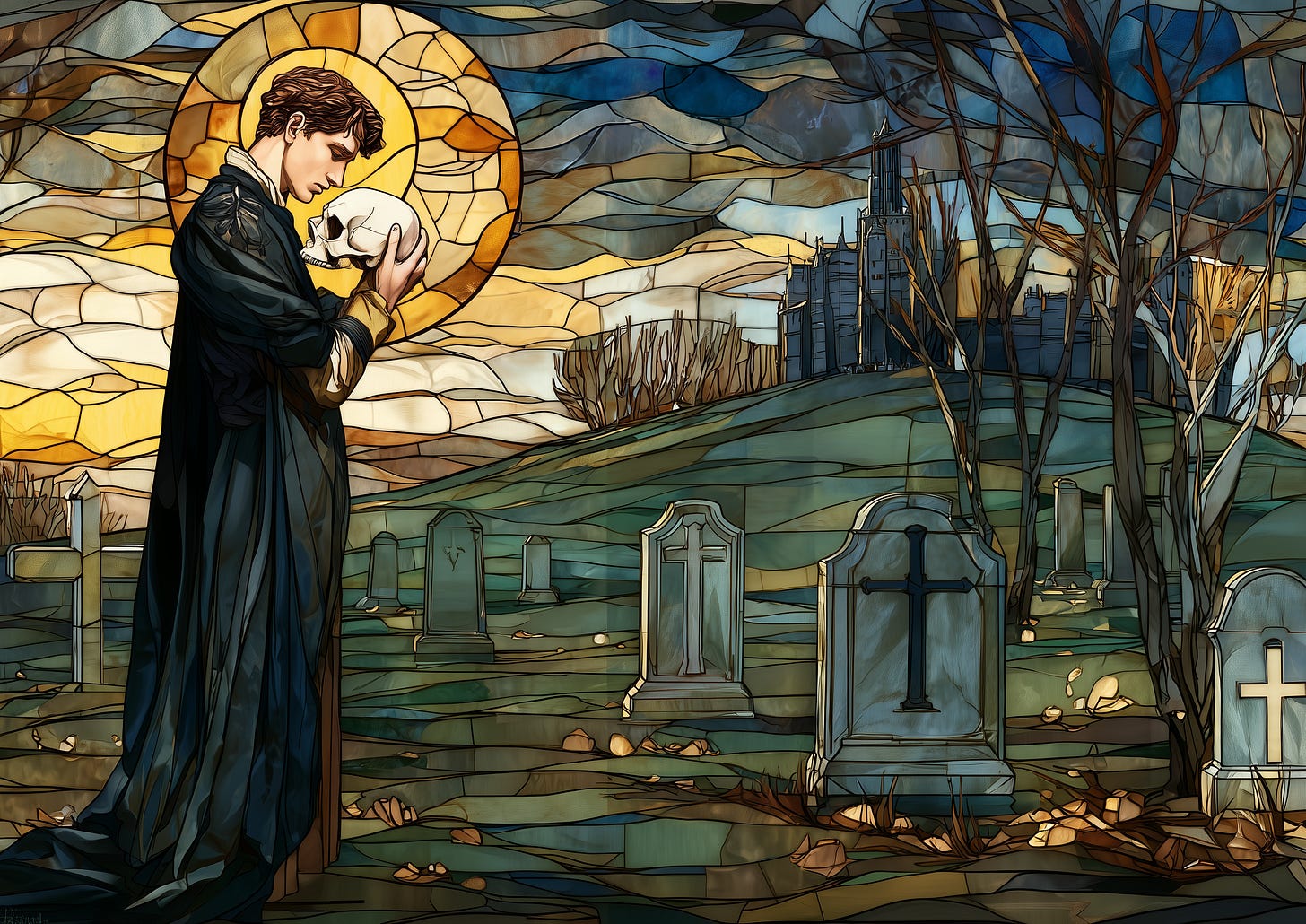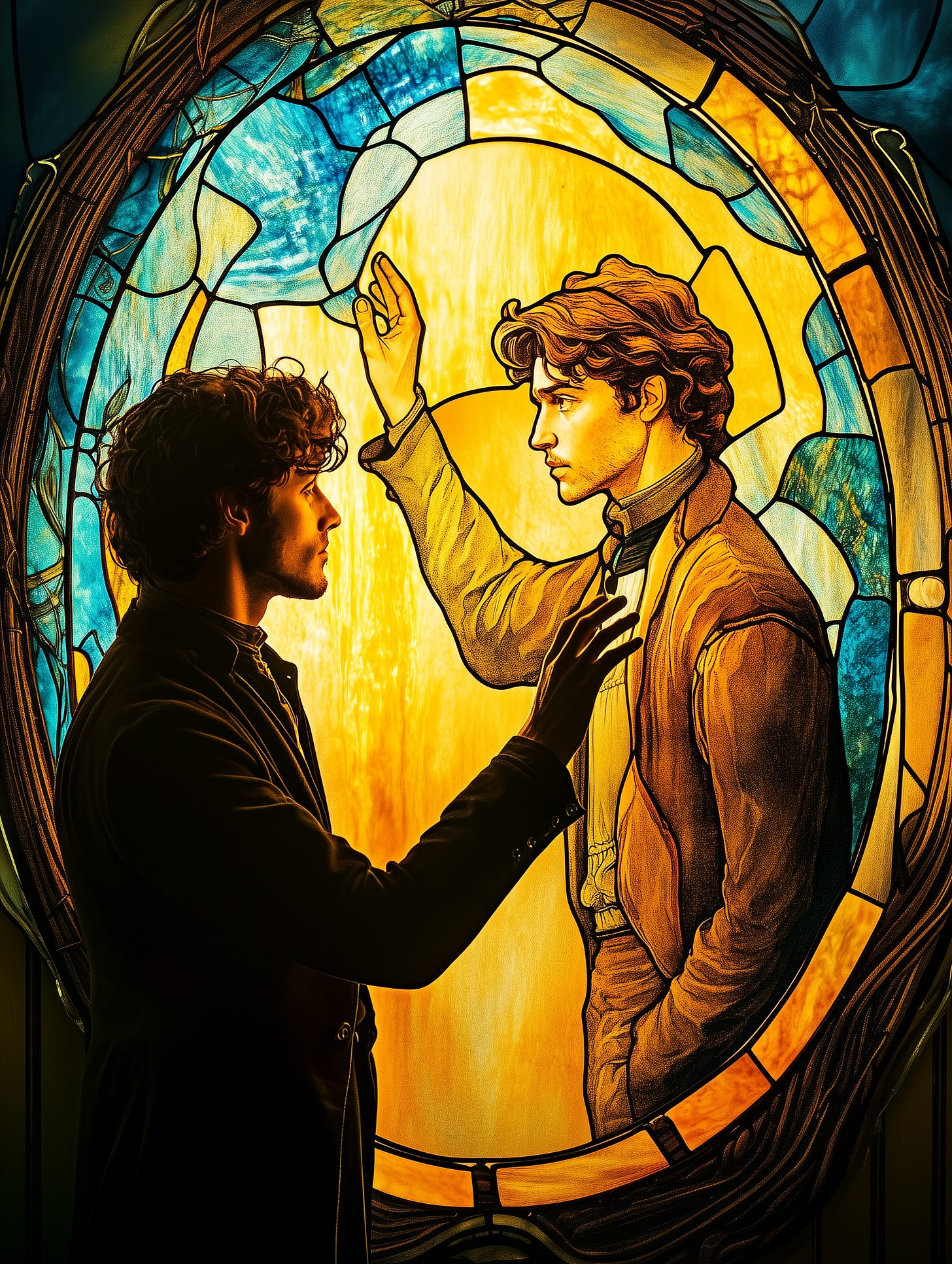The One Question That Transforms How You Read Every Story
The Question That Changes Everything - Series Introduction
I've been thinking about this pattern I keep noticing in literature... and once you see it, you can't unsee it.
Every tragic hero we've ever cared about - from Hamlet to Romeo to Jean Valjean stealing bread for his sister's children - they're all wrestling with the exact same thing. It's not fate. It's not character flaws. It's something much more specific and, honestly, much more hopeful than that.
They're all caught between what they need and what they believe is right.
The Question That Changes Everything
What if I told you there's one question that explains virtually every piece of great literature across cultures and centuries? One question that reveals why audiences connect so deeply with these stories, even when the characters make choices that seem completely irrational?
"What need are they trying to meet?"
I know... it sounds almost too simple. But stick with me for a minute.
Let me define these terms clearly:
Needs are fundamental requirements for human functioning - things we literally cannot survive without (or cannot thrive without). They're non-negotiable, like food, safety, connection, and purpose.
Values are our chosen beliefs about what's right, important, or worth pursuing - what we attempt to gain and/or keep. These include things like honor, loyalty, justice, or tradition.
There is also a crucial distinction: Needs are fixed - you can't choose not to need food or belonging. But values are chosen - whether consciously or unconsciously, we select what we believe matters most.
When these two things conflict - when your fundamental needs collide with your chosen values about what's right, what matters, or what defines you - that's where the story gets interesting.
Let's Start with Hamlet
Everyone knows Hamlet's problem, right? His father's been murdered, his uncle married his mother, and he's supposed to get revenge. Classic stuff. Here's what we can see when we look at it through this lens...
Hamlet isn't really struggling with whether to avenge his father. He's caught between a fundamental human need and a deeply held value that are pulling him in opposite directions.
The need: Safety and survival. Killing the king is basically a death sentence. Even if he succeeds, what happens next? Civil war? His own execution?
The value: Honor and duty. In his world, a man must avenge his father. This isn't negotiable - it's what defines him as worthy of respect.
So he's trapped between what he needs (to stay alive) and what he believes is right (honoring his father through revenge). He literally cannot see a way to meet his need for safety while maintaining his values around honor and duty.
The result? That famous indecision that leads to one of the most recognizable soliloquies in literature. He's not weak or cowardly - he's stuck in an impossible bind between what he needs to survive and what he believes he must do.
And Then There's Romeo
Romeo and Juliet is even more obvious once you see this pattern. Romeo's caught between his need for love and belonging (he's genuinely in love with Juliet) and his family loyalty values (Montagues don't associate with Capulets, period).
Juliet's facing the exact same conflict from the other side. Her need for authentic love and connection is crashing into her values around family duty and obedience.
What makes this tragedy particularly heartbreaking is that both of them try to find creative solutions. The secret marriage, the escape plans... they're actually pretty resourceful when you think about it. But they're operating in a system where their families' values make their fundamental human need for love literally impossible to meet safely.
The Pattern Across Cultures
This is what's really blowing my mind... this isn't just a Western literature thing. I started looking at stories across different cultures and time periods, and the pattern is everywhere.
Take the Bhagavad Gita - Arjuna's crisis on the battlefield is exactly this. His need for peace and safety (he doesn't want to kill his relatives) versus his value of duty and dharma (as a warrior, he must fight).
Or consider Scheherazade in One Thousand and One Nights. Her need for survival (don't get executed) conflicting with her values around truth and storytelling integrity.
Even modern stories follow this pattern. Think about any protagonist you've really cared about... they're usually caught between competing needs, or between a need and a deeply held value.
Why This Matters (And Why It's Actually Hopeful)
What I find fascinating about this lens is that... it completely reframes these stories from "inevitable tragedies" to "problems that might have been solvable."
What if Hamlet had been able to step back and ask: "Okay, I need safety AND I value justice. What are all the possible ways I could meet both of these?" Maybe he could have gathered evidence and exposed Claudius publicly. Maybe he could have allied with Fortinbras earlier. Maybe he could have found a way to honor his father without sacrificing himself.
What if Romeo and Juliet had been able to see their situation clearly through this lens? They both needed love and connection. Their values of family loyalty created the conflict.
With this awareness, what options might have opened up? They could have worked together as a team - using their love as proof that peace between families was possible. They could have found allies in both households who were tired of the feud. Most tragically, they could have simply communicated better about their plans. If Juliet had been able to tell Romeo about the sleeping potion, or if Romeo had waited to verify her death...
The heartbreak is that these young lovers were actually quite resourceful - the secret marriage, the elaborate escape plan - but they couldn't see past the seeming impossibility of reconciling their need for love with their families' values. They had more options than they realized.
I'm not saying these would have been easy solutions. But I am saying that when people are trapped between their needs and their values, there are usually more options than they can see in the moment.
The Question That Unlocks Everything
Here's one reason why this question - "What need are they trying to meet?" - is so powerful. It contains some revolutionary assumptions:
Human behavior is purposeful, not random or inexplicable
Underneath every action, there's usually an unmet need driving it
Current strategies might be ineffective, but the underlying need is legitimate
Better strategies for meeting that need are possible and discoverable
Understanding the true need is the key to finding workable solutions
Values aren't explicitly mentioned in the question, but they emerge naturally - once you start asking "what need are you trying to meet?" and exploring solutions, questions like "what's more important to you?" arise, helping identify the values in conflict
But here's what makes this question truly powerful: it reveals that most 'character flaws' aren't flaws at all - they're values-needs conflicts. What Aristotle called hamartia - the tragic flaw that brings down the hero - may not really be a character defect. Hamlet isn't indecisive by nature; he's torn between survival needs and honor values. Romeo isn't recklessly impulsive; he's trying to meet his need for love while his values of family loyalty create an impossible bind. Hamartia may exist, but it may not be the cause of all the downfall we've pinned on it.
Try it yourself: Think of someone whose behavior drives you crazy. Now ask, 'What need are they (likely) trying to meet?' Suddenly, their 'annoying' behavior starts making sense, doesn't it? That coworker who takes credit for everything? They probably need recognition. The friend who always cancels plans? Maybe they need rest or space but value your friendship too much to say no upfront. You may not be able to know their motivations with certainty, but asking the question gives you clues as to their possible reasons, which gives you an opportunity to see their situation with more insight.
When you start looking at literature this way, these characters stop being "fatally flawed" and start being recognizably human. They're doing what all of us do when we're caught between what we need and what we think is right... they're trying to find a way through.
What I'm Exploring in This Series
Over the next several articles, I want to dive deeper into this pattern. We'll look at specific stories and characters through this lens, exploring how understanding the needs-values dynamic might have changed their outcomes.
We'll examine:
How different cultures express this same fundamental conflict
Why audiences connect so deeply with these "impossible" situations
What these stories teach us about navigating our own lives when our needs and values seem to be pulling us in different directions
How asking "What need are they trying to meet?" can transform our understanding of both literature and human behavior
Here's what's worth exploring... the greatest stories across time aren't really about fate or tragedy. They're about the very human struggle to meet our fundamental needs while staying true to what we believe is right.
And once you start seeing that pattern... well, it changes how you read everything. It also changes how you understand the people around you, including yourself.
The Real Question
I'm curious ... have you noticed this pattern in stories you love? When you think about characters who've really stuck with you, are they caught between competing needs or between needs and values?
And more personally... have you ever found yourself in a situation where what you needed seemed to conflict with what you believed was right or what you valued? How did you navigate that?
That's really what this series, and my larger theory, is about. These aren't just stories - they're roadmaps for one of the most universal human challenges: how to meet our needs while honoring our values.
The tragic heroes might not have found the answer... but maybe we can.
Next time you're reading a book or watching a movie and a character does something that seems completely irrational, pause. Ask the question. What need are they trying to meet? What values are in conflict? I think you'll be surprised how often this simple lens reveals the real story beneath the story.
Next up: "Why Jean Valjean's Bread Theft Explains Human Behavior" - exploring how unmet needs drive seemingly irrational choices, and what Les Misérables teaches us about compassion and creative problem-solving.
What story would you like to see analyzed through this lens? Share your thoughts - I'd love to explore how this framework applies to the characters and conflicts that have resonated most deeply with you.
All articles in the One Question Series:
1 - The One Question That Explains Every Tragic Hero
2 - Why Jean Valjean’s Bread Theft Explains Human Behavior
3 - Why Anna Karenina Had to Die (And How She Could Have Lived)
4 - The Green Light Wasn’t the Problem: Gatsby’s Fatal Misidentification
5 - The Psychology of Breaking Bad: How Walter White’s Ego Built an Empire


